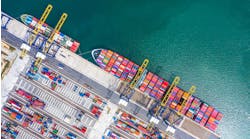Before we get too far into a discussion of the world’s top supply chains, we should acknowledge that any such ranking is subject to challenge, depending on what criteria are being used. For the past 15 years, analyst firm Gartner has been compiling a ranking of what it refers to as the Top 25 Supply Chains, and by virtue of the fact that nobody else really has a competing list, it’s become the de facto standard for supply chain in the same way that, say, Billboard Magazine is the arbiter for Top 40 radio.
Gartner doesn’t actually consider every company in the world to determine whose supply chain is the “best.” To start with, only public companies with annual revenue of over $12 billion are under consideration; on top of that, only companies in the manufacturing, retail and distribution industries are eligible. That leaves out a lot of companies that you might reasonably expect to be on such a list of supply chain leaders: no airlines, railroads, trucking companies, package delivery companies, shipping companies, construction firms, healthcare, metals producers, energy companies, banks, oil & gas, pipelines, or utilities were considered for the list.
There’s also a bit of a beauty contest aspect to the Top 25 Supply Chains list, since 50% of the ranking comes down to opinion: 25% is based on the opinions of 38 Gartner analysts, and 25% is based on the opinions of peer voters (supply chain practitioners, professionals and experts; in the interests of full disclosure, I am part of the peer panel). In terms of actual metrics, return on assets, inventory growth and revenue growth all factor into the final rankings. Gartner also includes a corporate social responsibility (CSR) score, which seems to be influenced as much by how well a company promotes its efforts as on actual CSR achievements.
Over the course of the past 15 years, Gartner has changed how it refers to the companies that are deemed to be the “best of the best,” presumably because it got a bit boring seeing Apple, Procter & Gamble, Amazon and McDonald’s at the top of the list every year. So a handful of companies who are extremely adept at managing their supply chain are now considered “Supply Chain Masters” and aren’t technically included on the Top 25 list at all anymore. In 2019, Unilever—which was ranked number 1 a year ago, has been promoted to the Masters list instead. So those five companies do not appear on the Top 10 this year.
All that being said, one of the main reasons why we cover the list so closely every year is that the Gartner rankings shine the spotlight on the specific supply chain proficiencies of 30 well-known brands, and goes into great detail to describe exactly how these companies’ success depends largely on their supply chain proficiency. That’s a story well worth telling, which includes observations from Gartner’s analysts as well as our own analysis, based on independent reporting. And below are links to previous editions of the Top 25.









